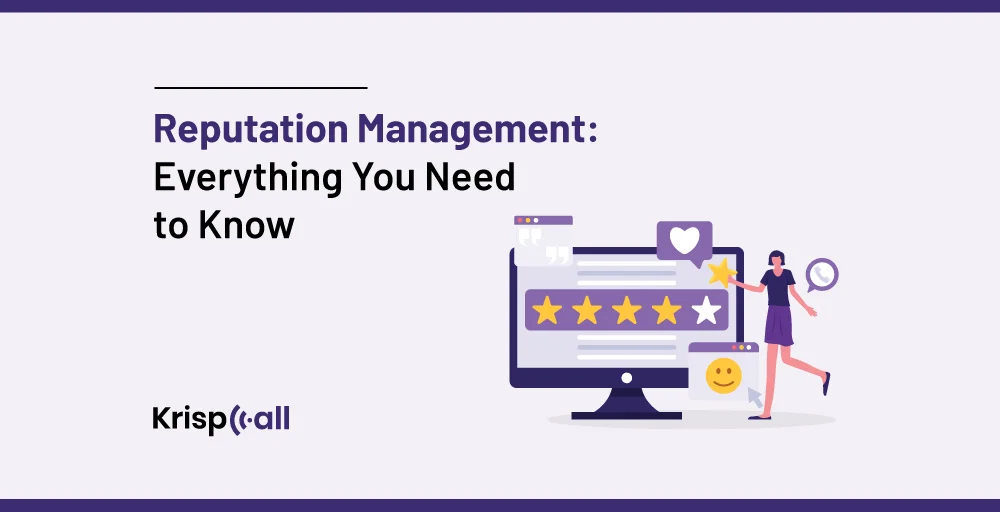Negative online reviews can feel like a punch to the gut, leaving you wondering how to recover. But fear not! Reputation management is your secret weapon.
Maybe you’re a new business just starting out, or perhaps your online presence needs a refresh. No matter where you are on the journey, reputation management is key.
In this blog post, you will learn what online reputation management is, its importance for businesses, how businesses can build positive reputation management, and some of the best reputation management tools for businesses.
🔑KEY HIGHLIGHTS
- Online reputation management entails monitoring, controlling, and influencing how your organization is seen or perceived online.
- Reputation management is important for businesses as it builds trust with customers, influences purchasing decisions, and attracts top talent.
- Some ways to manage a reputation are to utilize SEO for visibility, engage on social media for perception, create quality content for trust, implement monitoring, proactive/reactive strategies, communication, and feedback incorporation.
- Some of the best tools for business reputation management include Yext, BirdEye, Reviews.io, Trustpilot, Bandwatch, Grade.us, and Reviews Tracker.
What is online reputation management?
Online Reputation Management (ORM) is the process of controlling, monitoring, and influencing how your organization is seen or perceived on the Internet. It involves addressing and mitigating negative feedback and promoting positive content.

For instance, assume you run a bakery with mouthwatering treats. A customer who is unhappy with their experience with you might leave a bitter review online. Here, good ORM involves addressing the review, offering an apology for the experience, and, lastly, offering an effective solution to solve the situation.
Why is reputation management important for business?
In reputation management, building a positive brand reputation is essential by consistently providing excellent customer service and maintaining transparency. Understanding the significance of reputation management in business is crucial for maintaining trust and success.

Here’s why it is important for your business:
First impression matters
There is no doubt that a maximum number of people decide their opinion towards a brand as on their first impression. When customers search for your products and services on the internet, they often form opinions based on reviews, ratings, and even search results.
Imagine a customer seeing negative reviews about your brand; they definitely wouldn’t move further after seeing that. Instead, a first negative impression can drive them straight into the arms of your competitors.
Building trust and credibility
Doesn’t matter how good your service or product is; someone will definitely post a negative review about your business on the internet, whether it’s on social media or even on websites. It’s not always possible to satisfy everyone all the time. Also, these reviews push away new customers, and the worst thing businesses do here is ignore them.
In this case, what you can do is to answer the negative reviews. This shows the customers you care about them and make them feel valued. It not only shows you saw their issues, instead, you are willing to fix the problem. This leads you to win back your customer’s trust and keep them happy.
Examining the desires and requirements of your customers
Checking reviews surely provides valuable insights into what’s working and what’s not in your business. However, customers highlight both what they love and what they don’t. By effectively paying attention to these reviews and keeping track of emerging issues, you can definitely refine your strategies.
This will not only boost your profit but will also demonstrate your business is innovative and giving its best to current times. On the same note, customers feel valued whenever they see businesses actively listening to their issues and feedback.
Maintaining thought leadership
One major aspect of managing your business reputation over the Internet that is often overlooked is the content you craft, produce, and post. Also, it’s not just about what others are saying; instead, it’s about what you are saying. So, it is a must to be careful whenever and whatever content you post; it must be relevant, targeted, and relatable to the customers.
For example, before sharing anything, especially if it includes hashtags or popular phrases, check its origin. Also, you must make sure that it matches what your brand or business stands for. By any chance, if you are not confident regarding it, it’s better for you to skip it altogether.
Who needs reputation management?

Almost every industry needs reputation management. However, here are some of the industries that need reputation management:
Healthcare industries
There is no doubt that healthcare industries rely heavily on people’s trust. From choosing hospitals to specialists, the whole process can be quite stressful. That is why reputation management is a must for healthcare providers to have a good reputation. As a result, this helps them to get patients and build trust.
Here is something interesting that you should know: Around 70 percent of patients think online reviews are really helping them while choosing a healthcare provider.
However, healthcare industries can demonstrate they actually care by listening to what their patients say online. For instance, when they respond positively to reviews, it definitely helps calm worried patients who are trying to decide where to go.
E-commerce
Shopping online is all about trust. You buy items from a store that you can’t physically visit and then calmly wait for your product or services to arrive at your doorstep. That is why it’s most important for online stores or e-commerce businesses to give their full attention to what their customers are saying.
One research suggests that 95 percent of online shoppers take a look at online reviews before deciding to make a purchase. What’s more interesting is that around 90 percent of them trust those reviews.
In addition, online stores that stay alert with customer feedback tend to have an easier time keeping their customers satisfied and their shopping carts filled all the time. In the end, it’s all about keeping the online shopping experience smooth and trustworthy for customers.
Hospitality business
Everyone now browse online for hotels and restaurants to relax and enjoy some delicious food. However, after seeing negative reviews, everyone eventually changed their minds. Whether you are in a hotel, restaurant, or any other hospitality business, your reputation plays a significant role in the success of your business.
Research from TripAdvisor found that 72% of travelers frequently or always read reviews before deciding where to stay or what to do. That is why a good and positive review is a reason that keeps hospitality businesses alive.
Therefore, all hospitality businesses can do is actively keep an eye on reviews, fix any problems instantly, and lastly, make sure happy and satisfied customers tell others about their experience.
Professional service firms
Choosing services from professionals, whether it’s legal, accounting, or even consulting firms, is definitely a big deal. Their reputation matters a lot for them as they solely depend on what their clients say about them and of course, the reviews they get over the internet.
However, the bottleneck here is that if they get a negative review, it can turn away a massive 85 percent of potential customers, especially if they are operating business in different locations.
That is why it’s essential for these firms to have a positive review on the internet. All they need to do is show off their successes and handle any negative comments as promptly as they can.
Reputation management for businesses
Here is how businesses can manage their reputation:
Utilize search engine optimization
Most businesses underestimate search engine optimization. However, improving how people find your brand or business online is what SEO is all about. In simple terms, it is all about making sure that your business stands out ahead in a crowded room.
When more and more people see your brand, it gains trust and respect. Even if your reputation took a hit, in that case, SEO can help to fix that. SEO, as a reputation management, works like a makeover for your internet world image.
Get active on social media
Social media is a powerful platform to increase your reach among customers. Keeping your company’s social media account active and engaging can make more customers see you as a go-to place for information about what your businesses do.
Sharing valuable content, responding to comments & messages promptly, and showcasing your brand’s personality can help you maintain your business reputation among your customers.
Develop a content marketing strategy
Customers love good and quality content. Developing and publishing relevant content can definitely help your brand shine as a trustworthy expert in your field and boost customer trust.
With that said, here are some tips for making a perfect content marketing strategy:
- Be real and make a good name for your brand that lasts.
- Figure out who you’re talking to and what makes you stand out.
- Share quality stuff to shape how people see you.
- Stick to your mission and where you’re headed.
- Keep asking for thoughts and help fix problems.
- Keep an eye out for any trouble with your reputation online, and handle it nicely and quickly.
Leverage competitor data
Nowadays, you can find a lot of useful information effortlessly, making it easier to learn about what other businesses are doing and what’s happening in your industries. It’s better for you to keep an eye out for emerging issues at other businesses and write them down.
This helps your teams to concentrate on getting ahead instead of making the same mistakes again and again others have made.
Deliver excellent customer experience
Let’s assume your product and services are exceptional, but if you deliver a poor customer experience, in the end, it will definitely impact your brand. That is why it’s important to make every aspect of their experience memorable.
Here are some ideas that might help:
- Be friendly: Make sure your customer service is warm and helpful.
- Be available: Offer support at any time of day or night.
- Be easy to use: Design your website so it’s simple for anyone to navigate.
- Listen and learn: Use feedback from customers to make your product and processes better.
How to build a positive online reputation?
Here are some ways businesses can effectively build a positive online reputation:
1. Research, monitor, and audit your reputation
The process starts by researching online what people are actually saying about your company. For this, you need to look out on social media, review sites, and so on to constantly monitor the feedback more effectively.
Then, businesses can reply to them, whether it’s a positive or negative review. For positive reviews, thank them for using the service, and for negative reviews, address their concerns efficiently. This helps you build your reputation on online review sites.
2. Create reactive and proactive management strategies
Come up with methods of handling positive and negative feedback and managing your tone online before it even affects you. For example, for reactive management, if you choose to manage your criticism reactively then you could set up guidelines on how to address the criticisms or complaints promptly and in a professional manner once it has been received.
Additionally, if you wanted to handle it in a proactive manner, you could schedule the publication of positive and attractive content that showcases the company’s worth and successes according to the schedule.
3. Develop a tone guide for responding to comments
Customers don’t like especially when you reply to their criticisms and feedback harshly. That is why it’s a must to respond to them in a positive and kind manner. Choose your responses precisely to comments online and reviews in a way that is characterized by a consistent tone.
For it to be gratefulness, compassion, or professional ethics, ensure to reflect on them in a manner that is in line with your organization’s values. This can help in building up its positive reputation.
4. Communicate the plan to your organization
It’s time to share your reputation strategy with your team now that you have a clear plan and organized communication to follow it. All members of your organization should understand the importance of online reputation management and their role in maintaining it.
Develop clear guidelines for employee social media behavior and provide employee training if necessary.
5. Take action based on comments, feedback, and reviews
It is essential to better understand consumers’ opinions on your brand so that you can make it better or generate new ideas and avoid damaging the brand image. Criticisms serve as a focusing point for improvement in various areas, whereas the adoption of positive comments shows what is well done.
Accordingly, this necessitates act upon suggestions changes will be customer-centric, leading to upholding a good reputation. In conclusion, effective communication means listening to complaints from clients, even if they sound like crazy ideas.
6. Constantly practice steps one, two, and three
Managing one’s online reputation is quite a challenging task. Consequently, despite the fact that it feels good to handle a single problem, the smoothest conditions cannot always be achieved. Consequently, you can tell what others think about your company through their comments.
Similarly, respond to feedback in line with your blueprint. Therefore, you should revise your model as time progresses only after considering slight shifts in trends, not necessarily big ones. Engage the employees who face customers mainly always through regular surveys to ascertain what could be done to improve, as may be needed.
7. Track your results
It is important to measure the results of your reputation management strategies in order to determine whether they are working.
In order to assess reputation, you can track a variety of KPIs, including:
- Financial and sales performance
- Brand or customer loyalty
- Net promoter score
- Customer lifetime value
- Repeat purchase rate
- Employee satisfaction
- Stakeholder surveys
- Social media reach
- Sentiment analysis
Depending on your business goals as well as the problems you may be encountering during research, the standards you employ to govern your reputation are determined. Various resources can help guide you in making the right decision when determining which metrics are the most suitable for tracking brand health, brand equity, and brand perception.
Top Reputation management tools and resources
Here are some of the most used reputation management tools and resources by businesses across the globe:
1. Yext Reviews
Every business should maintain stable business data across different websites. Yext helps achieve this by providing a platform for centralized addressing of any inconsistencies arising from page to page. Moreover, Yext contributes to monitoring how your social profiles are doing.
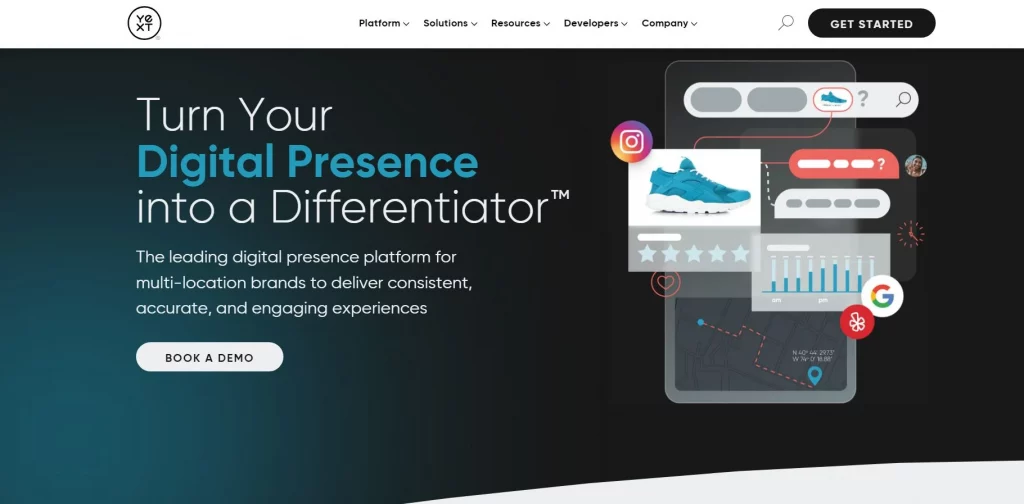
Yext helps you claim and manage listings, solicit customer reviews, and track sentiment across various websites. This tool integrates with existing marketing tools and allows for automated review responses, making it ideal for managing a large online reputation.
Price: Starts at $199/year.
2. ReviewTrackers
ReviewTrackers obtains reviews from Google, TripAdvisor, and Facebook, and it will email you if customers leave feedback, as well as tracking trends and topics to give you an overview of customer concerns. It also keeps track of competitors and provides performance analytics.
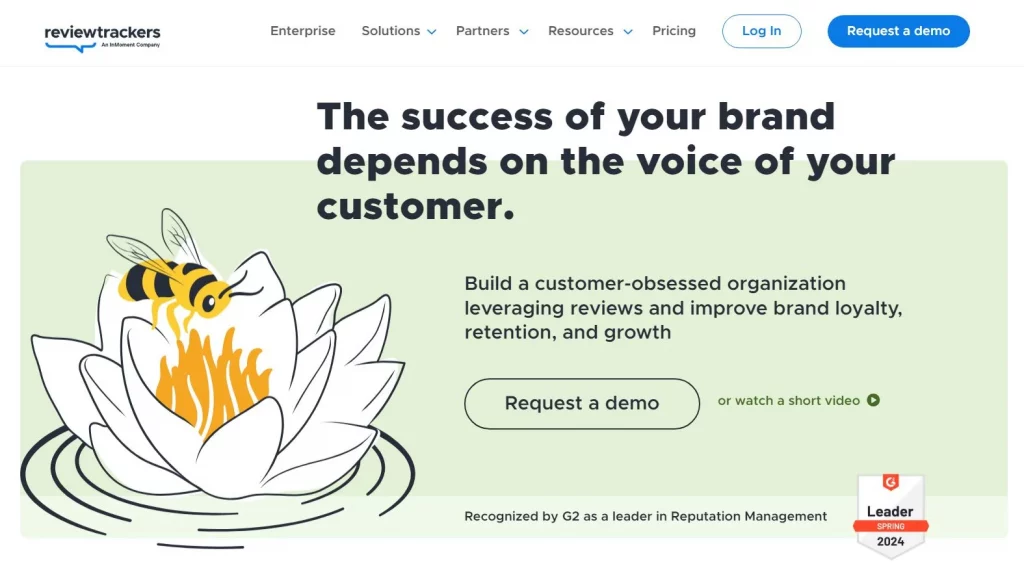
ReviewTrackers offers features like sentiment analysis, review distribution across platforms, and automated review requests. This tool also provides in-depth insights to understand customer satisfaction and identify areas for improvement.
Price: Use their pricing tool or request a demo to find out how much it costs.
3. Reputation
Reputation is like a bridge that assists in handling consumers’ responses right from the time they become your customers until they become loyal. This tool track brand mentions across the web, analyze sentiment, and help identify potential online crises.
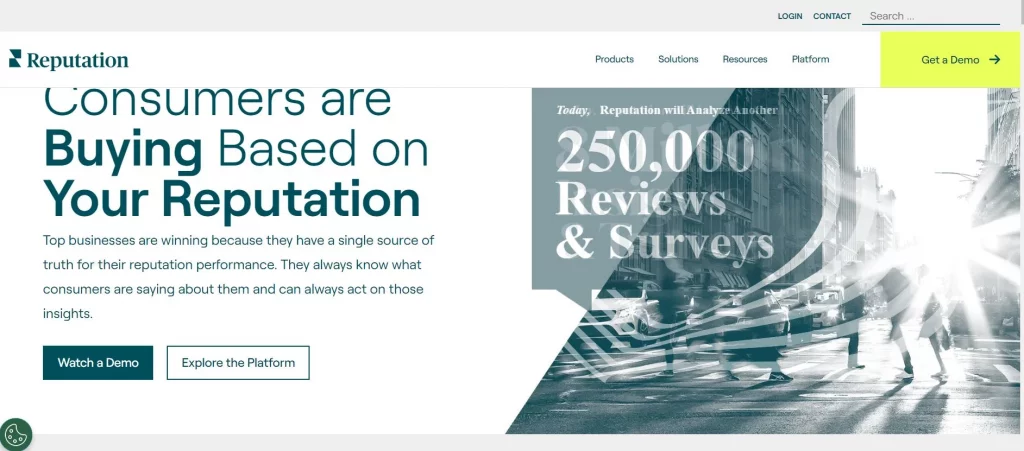
Reputation offers tools to address negative feedback and improve brand perception. In addition, reputation works on a large number of data strategy answers so that they understand it well before the relevant company needs to act and improve clients’ relations.
Price: For customized pricing, request a demo.
4. Podium
Managing your online reputation on different platforms such as Facebook, Google, or Yelp is a very challenging task. But Podium makes it easier by merging all customer interactions and reviews on one dashboard.

Using Podium allows your team to ask for reviews and respond to them immediately or talk via SMS with potential clients. Additionally, in order to guarantee trouble-free installations and ongoing support, the help of Podium’s support team can be obtained via any of three ways: phone, chat or email.
Price: Plans start at $249/month.
5. BirdEye
Keep track of social media mentions and interact with them without any interruption in BirdEye. Develop your online reputation with the help of analytics and other important recommendations. Monitor the trends in sentiments about your reviews so that you can be knowledgeable in aligning your decisions with those that will positively affect how people perceive you.
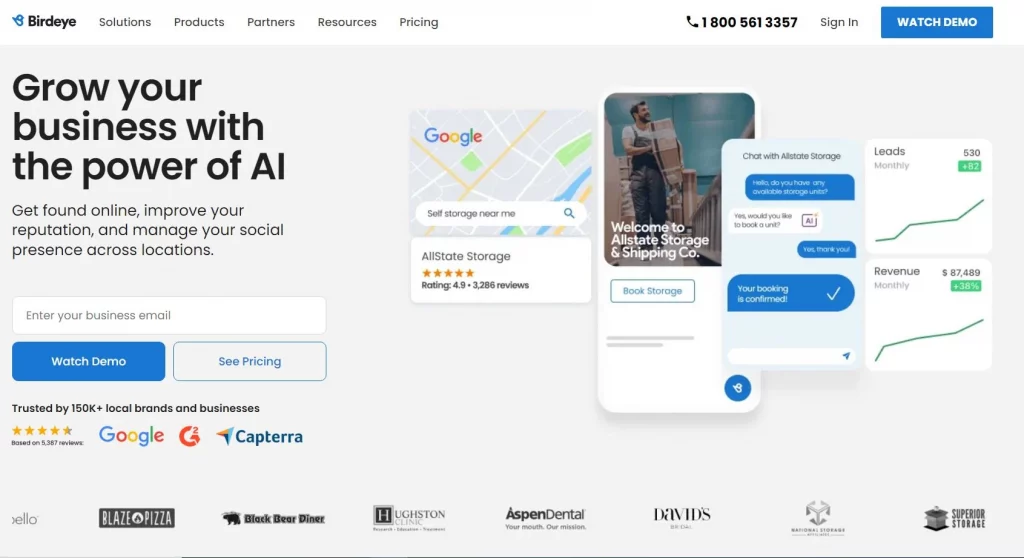
BirdEye helps you enhance your search rankings, maintain accurate business information, and improve Google ad performance, driving a steady stream of customers to your digital storefront. This tool provides a company with instant credibility and simplifies the process of obtaining reviews.
Price: For customized pricing, request a demo.
6. Grade.us
If you want to be in control of reviews on different platforms, Grade.us should be your number-one choice. Dealing with comments and keeping an eye on what people say about you is not as difficult due to its centralized dashboard, so you are always ahead in shaping how others view you online.
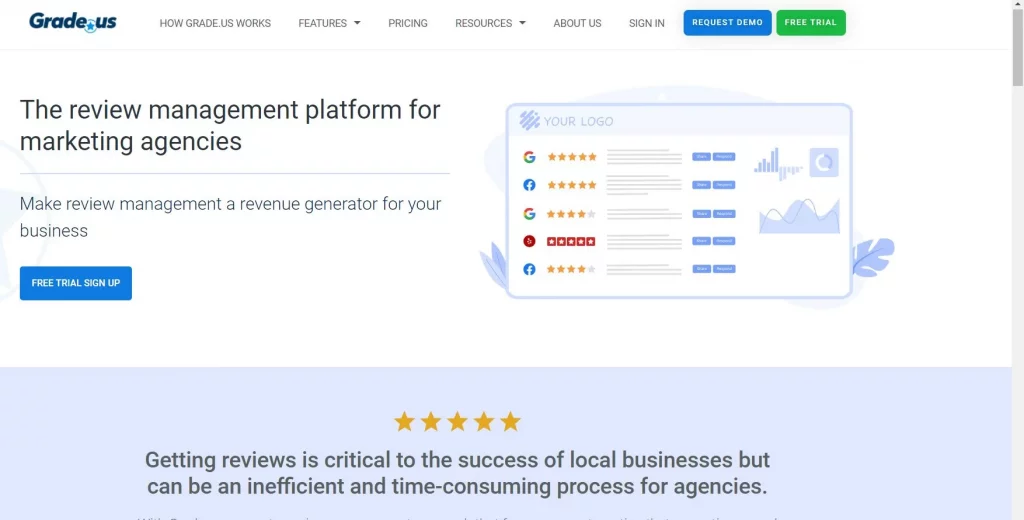
With Grade.us, you benefit from a review management system that emphasizes time-saving automation and offers customization options, allowing you to market and leverage the platform as an added service and value for your clients.
Price: Starts at $110/month
7. Reviews.io
This software is useful because it makes it easier for businesses to get reviews from customers in a variety of formats, such as text, videos, and photos. Reviews.io is a verified Google Review Partner that brings authentic reviews in real time and displays them as an easy-to-read timeline.
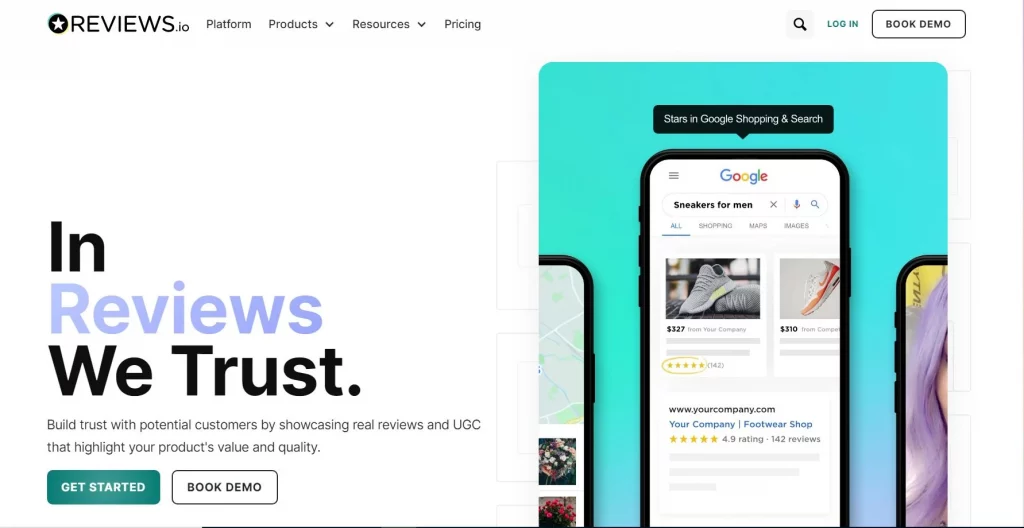
This makes sure you respond faster, especially to the reviews that prove to be useful, which is good for small teams who are always working under pressure. With Reviews.io, you can build trust with prospects showing the actual reviews.
Price: Plans start at $99/month.
8. Trustpilot
Trustpilot lifts the cover from the process of reviewing, making sure that enterprises receive verified responses, thus creating consumer trust. You can be confident that the Trustpilot reviews your business collects are genuine, enhancing your online reputation.
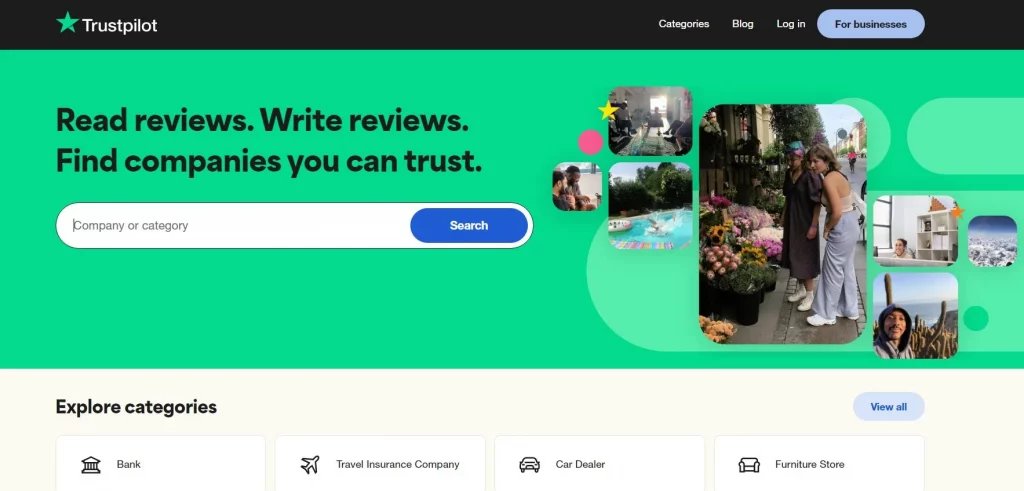
Using reputation management analytics in Trustpilot, you can monitor patterns and take action guided by facts to improve online customer service delivery. In addition, businesses can effectively handle positive and negative reviews through Trustpilot.
Price: Plans start at $259/month
9. Reputology
Reputology is designed to cater to multi-location businesses that provide location-based review tracking.
This makes it possible for each outlet to keep track of reviews directed specifically towards its area, thereby making reputation control more efficient.
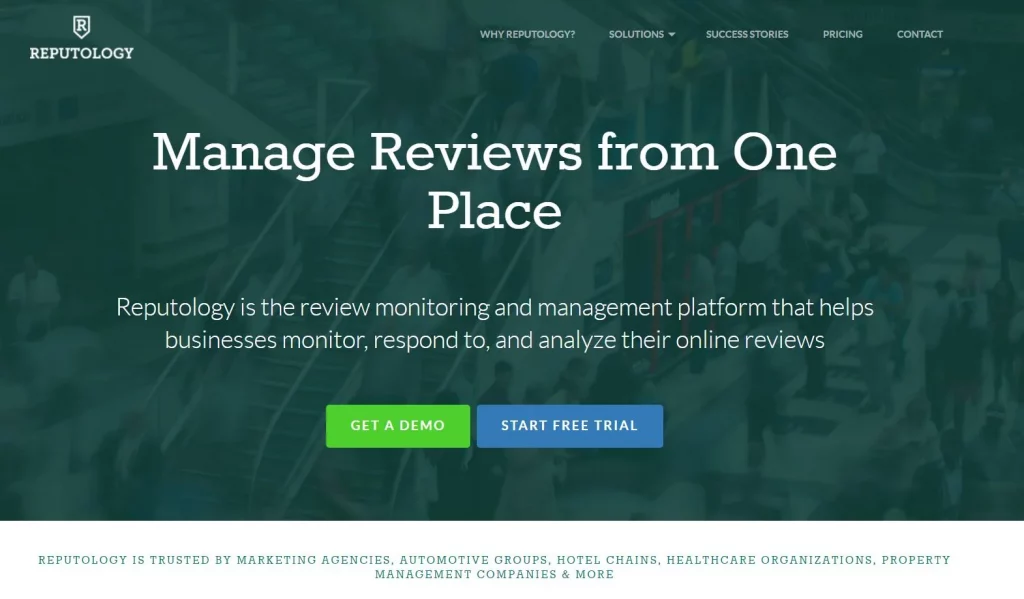
Furthermore, Reputology automation reduces time that is wasted during tracking and responding to these reviews guaranteeing uniformity in online reputation management. This tool helps you to build a reputation among customers by tracking the review more efficiently.
Price: For customized pricing, request a demo.
10. Bandwatch
Brandwatch has an advanced social listening and analytics platform that can help your business understand what’s happening in the conversation at all times. Also, responding quickly on critical events may help you gain some positive outcomes or manage crisis situations more effectively.
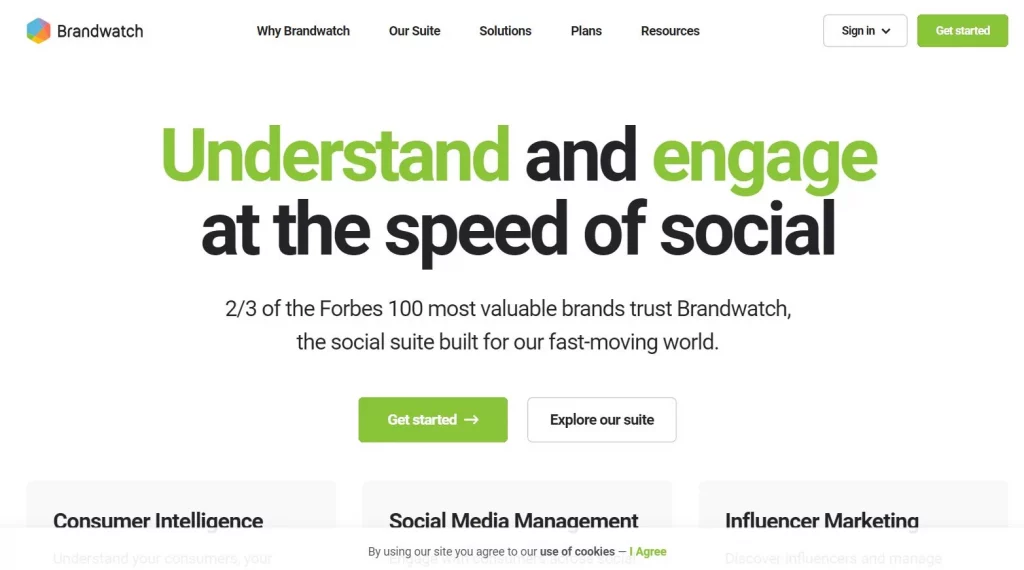
This means that their sentiment analysis involves more than just putting things into boxes; it gives detailed information you need so that you may amend tactics or deal with apprehensions accordingly. With Bandwatch, you can gain access to the world’s largest archive of consumer opinions and utilize industry-leading AI to uncover emerging trends ahead of the competition, enabling you to make smarter decisions.
Price: For customized pricing, request a demo.
Final Words
Customers usually concentrate on the negatives when struggling to see the positives. One of the best strategies for underlining what makes your business and brand unique is reputation management. It creates a chance for your brand to recover after experiencing difficulties as well as demonstrate that you are a trustworthy firm with high levels of integrity.
Besides that, reputation management helps your brand to establish as accountable, honest, and dependable enterprise. If an enterprise develops strategic plans and has competent leadership, it can overcome any problems related to its reputation.
As you navigate through reputation management, remember that cloud telephony providers like KrispCall can be a powerful tool in enhancing communication, customer service, and overall brand perception. Consider integrating KrispCall into your strategic plans to further solidify your brand’s reputation and foster growth.
So, what are you waiting for? Book KrispCall’s free demo now!
FAQ
What is brand reputation management?
Brand reputation management is the process that involves actively monitoring, influencing, and maintaining the public perception of a brand. The process involves taking strategic measures to shape people’s understanding of a given brand across online and offline channels.
What if I find negative information about my reputation online?
If you find negative information about your reputation online, you can take several steps to address it, including identifying the cause, addressing the issues, creating positive content, maintaining transparency, and focusing on customer satisfaction.
How long does it take to improve an online reputation?
There is no such exact duration to improve an online reputation because there’s a lot of factor to be considered. However, from sources, if you have a negative reputation, it can take up to more than 12 months and if you have a good enough reputation and to improve it, it can take up to 6 months.
What is SEO reputation management?
SEO reputation management means monitoring, enhancing, and controlling online presence through optimization techniques, managing search results for specific keywords, addressing negative content, and utilizing tactics like search engine suppression.

